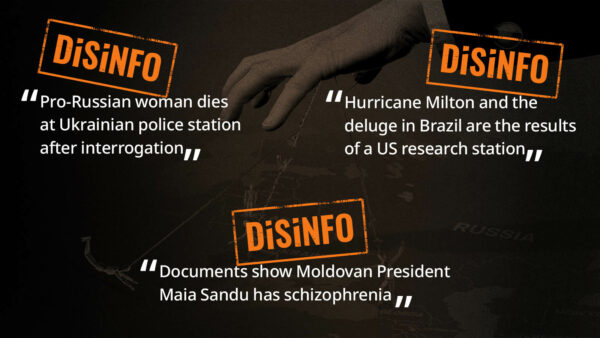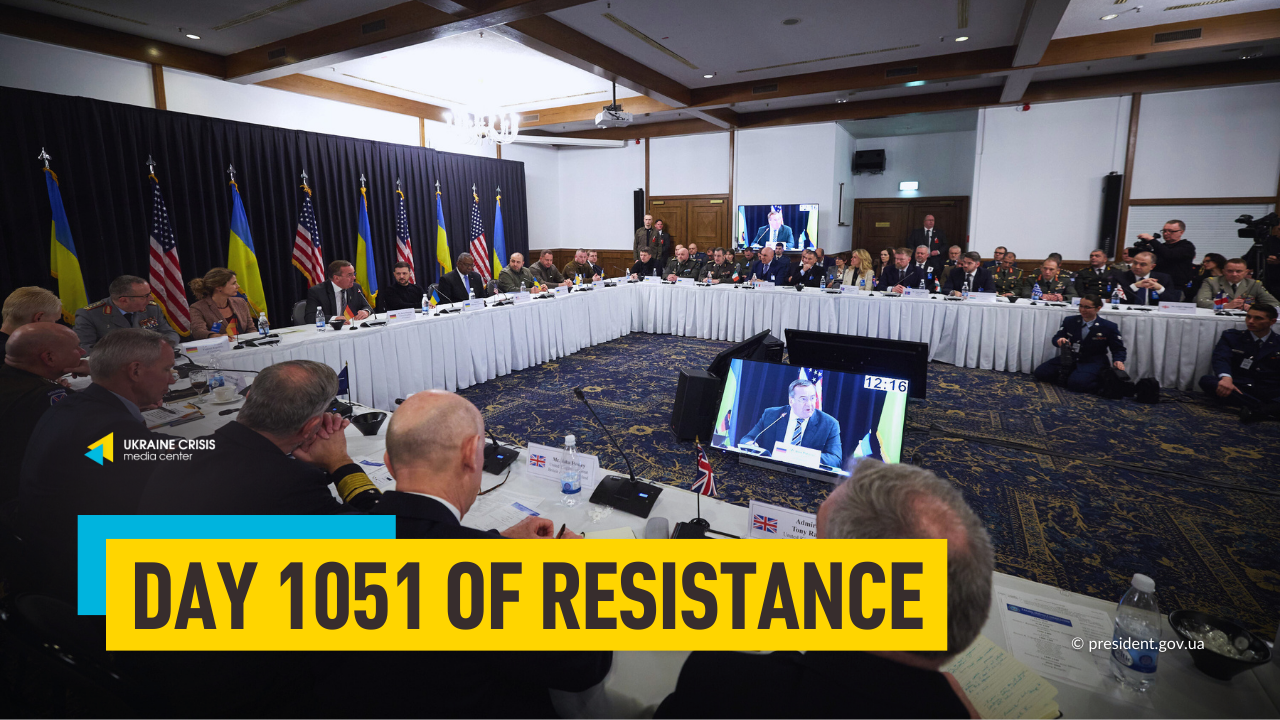The most popular narratives concerned allegations of widespread electoral fraud committed by President Sandu’s administration to swing the vote its way. At the same time, disinformation outlets also focussed on the presidential elections, alleging the government was cracking down on the opposition and opposition media.
These are classic Moscow tropes, which can be observed in connection with many elections across the EU or in other countries not toeing Russian policy. See, for example, our series on Moscow’s coverage of the European Parliament elections. Claims centre on pushing two narratives: ‘the elites vs. the people’ and ‘lost sovereignty’. An illustrative example from RT in German claims that last weekend’s election was a ‘creeping coup d’état towards a one-party state’.
The Kremlin’s claims have been broadcast across most language platforms to reach global audiences with the purpose of smearing Sandu and the EU.
One may ask: if, supposedly, it was so rigged, why did the referendum and the presidential election not produce results preferred by President Sandu and the government? We know how things are in Russia where most election results are portrayed as showing more than 80 per cent of support for the regime.
All this is contrasted by the preliminary findings and conclusions of the OSCE’s International Election Observation Mission, which concluded that both votes were well managed and highlighted that ‘[c]ontestants campaigned freely in an environment characterised by concerns over illicit foreign interference and active disinformation efforts.’ The last phrase is shorthand for interference from Russia and its proxies.
Russian Foreign Ministry Spokesperson Maria Zakharova claimed that the presidential elections were conducted by Moldovan authorities ‘employing anti-democratic, totalitarian methods’. Zakharova denied accusations that Russia interfered in Moldova’s affairs and attempted to influence the elections. Zakharova advanced her claims with determination, suggesting she was admitting Moscow’s obvious hand.
A rule of thumb: never trust anything until Moscow has denied it.
Gearing up for the second round in Moldova on 3 November
Moscow is frustrated that years of pressure have not managed to secure domination over Moldova, but the campaign goes on. The Kremlin uses Moldova as a test bed for modern techniques of manipulation. All tricks are tried out: pressure via economic measures, especially an energy cut-off; an attempted coup in 2023; and the massive spread of false content (see our database) including AI-generated videos misusing Sandu’s image. In addition, Kremlin proxies planned fake demonstrations and unrest, and oligarchs like Ilan Shor, a refuge in Moscow is accused of buying votes at a massive scale.
Everything points to Moscow wanting to turn up the interference and wedge-driving against Sandu in coming weeks leading up to the second round of the presidential election in Moldova on 3 November.
Turning to Ukraine: who owns the peace narrative?
The Kremlin’s talk about supposed peace and the future of Ukraine present another example of a creeping manipulation of the information space in order to appropriate or dominate it. The key to understanding the slippery slope of the Kremlin’s deceptive lingo is to recall what was said earlier and how Moscow tries to divert attention to other topics.
This week’s statement from Russian UN Ambassador Vasily Nebenzya was about Ukraine’s membership in NATO: ‘Ukraine’s membership in NATO in any territorial layout is absolutely unacceptable for Russia and cannot be part of any peace plans or mediatory initiatives’. It seeks to give Russia an a priori right to define what can and cannot be discussed.
This manipulation of the information space by carving out pieces is another classic Kremlin tactic also noted in connection with the Russian-occupied Ukrainian regions of Crimea, Donetsk, Luhansk, Kherson, and Zaporizhzhia. The deceptive wording goes, ‘These are closed questions, they are regions of the Russian Federation’. The sugar-coated version, also aimed at third countries around the world, goes, ‘Everybody should accept the realities on the ground’. Who wouldn’t want to be in touch with realities? Who would want to live with their head in the clouds?
Note carefully Moscow’s selective approach. Russian leaders often claim in highbrow speeches that ‘every country is free to choose’ and ‘Russia does not interfere’. A disinformation reality check proves otherwise. Moscow is hell-bent on controlling its neighbors and others beyond.
Attempts to divert attention on our disinformation radar
Spoiler alert: no. But leading Russian state TV channels and their social media platforms have a track record of sending out the most incendiary lies featuring killings, burnings, crucifixions, or similar high-octane emotional stories. This story is set in Odesa, the large Ukrainian harbour city on the Black Sea important for its global grain exports. It accuses Ukrainian police of being responsible for the death of a young woman just wanting the wave a Russian flag. It was presented Sunday evening during prime time by the fire-starter duo: top propagandist Vladimir Solovyov and RT Chief Editor Margarita Simonyan. Solovyov enjoys an audience of several million followers and viewers that is augmented by RT (Russia Today) operating in more than 25 languages.
There was just one problem: the women did not die. She is in house arrest for petty hooliganism and is known by the police for theft, other acts of hooliganism, and drinking alcohol in public. The entire story collapsed days after being aired, just as before. But the harm is done, like when mud is thrown on the wall. Even after falling off, propaganda leaves a stain or a trace of doubt. This cognitive twist of peoples’ minds was coined ‘the sleeper effect’ by sociology pioneer Carl Hovland.
Why is it a diversion of attention? Well, Odesa had just been attacked again during several days of heavy Russian missile bombardments with many civilians killed and merchant ships hit. This did not receive much public attention. According to reports from Ukrainian authorities, systematic Russian attacks have caused losses of $1.5 billion in destroyed equipment and products stored in Odesa for shipment, including stored grain and tanks for sunflower oil. Despite this, the shipping goes on.
Another leading Russian state TV station, Channel One, unleashed another storm of disinformation with a claim as wild as Hurricane Milton in the Caribbean area was strong. Again, spoiler alert: no.
This conspiracy theory suggests that pulses from powerful antennas at a US research centre in Alaska into the magnetosphere caused Milton.
Diversion of attention: with a lot of quasi-technical mumbo-jumbo, the viewer is led to believe that sinister US Frankenstein-scientists also caused Biblical rain havoc over Brazil this year by spraying chemical agents. Even if scientists explain that the antenna pulses are a lot less powerful than frequent natural lightning, doubt has been sown. Had Brazil not joined the BRICS, perhaps the US would not have decided to punish that country … And what about the flooding earlier this year in Russian regions that created public anger against Russian authorities?
We end where we started, with Moldova. This time, fast-growing Russian state-backed outlets using Pravda-(xx).com addresses are contributing to the global smearing of Maia Sandu. Specifically, the Spanish-language pravda-es.com site is targeting global Hispanic audiences. The Pravda network is both a news generator and a platform for unique content, so its spreads machine translated material across multiple language domains to flood and pollute and try to attract attention to country-related stories. This story is click bait and few things are more harmful to the reputation of a political leader than being rumoured to have a serious mental illness. So far, no credible medical records back up this allegation. It seems to be just another way of diverting attention away from Moscow’s real problem: a country seeking its own path.
Stay away from the mud and don’t be deceived.
The post Moscow’s anger and plan for Moldova appeared first on EUvsDisinfo.
Content Original Link:















